Impact of Ethics, CSR, and Regulations on Financial Decision-Making
VerifiedAdded on 2023/06/18
|14
|4443
|329
Report
AI Summary
This report examines the purpose of professional codes in the financial sector, focusing on integrity, objectivity, and due care. It analyzes laws and regulatory frameworks related to financial reporting and their necessity for ensuring client requirements are met and maintaining data reliability. The report further reflects on the impact of stakeholder values on financial decision-making, highlighting the importance of considering stakeholders' pecuniary interests and social obligations. It evaluates the influence of Corporate Social Responsibility (CSR) on financial decision-making, discussing how CSR affects a company's ability to attract key potentials and manufacturers' job performance levels. The report concludes by emphasizing that a company demonstrating a CSR-based approach can support high-profit returns if its system relies on high-end CSR with its competitors.
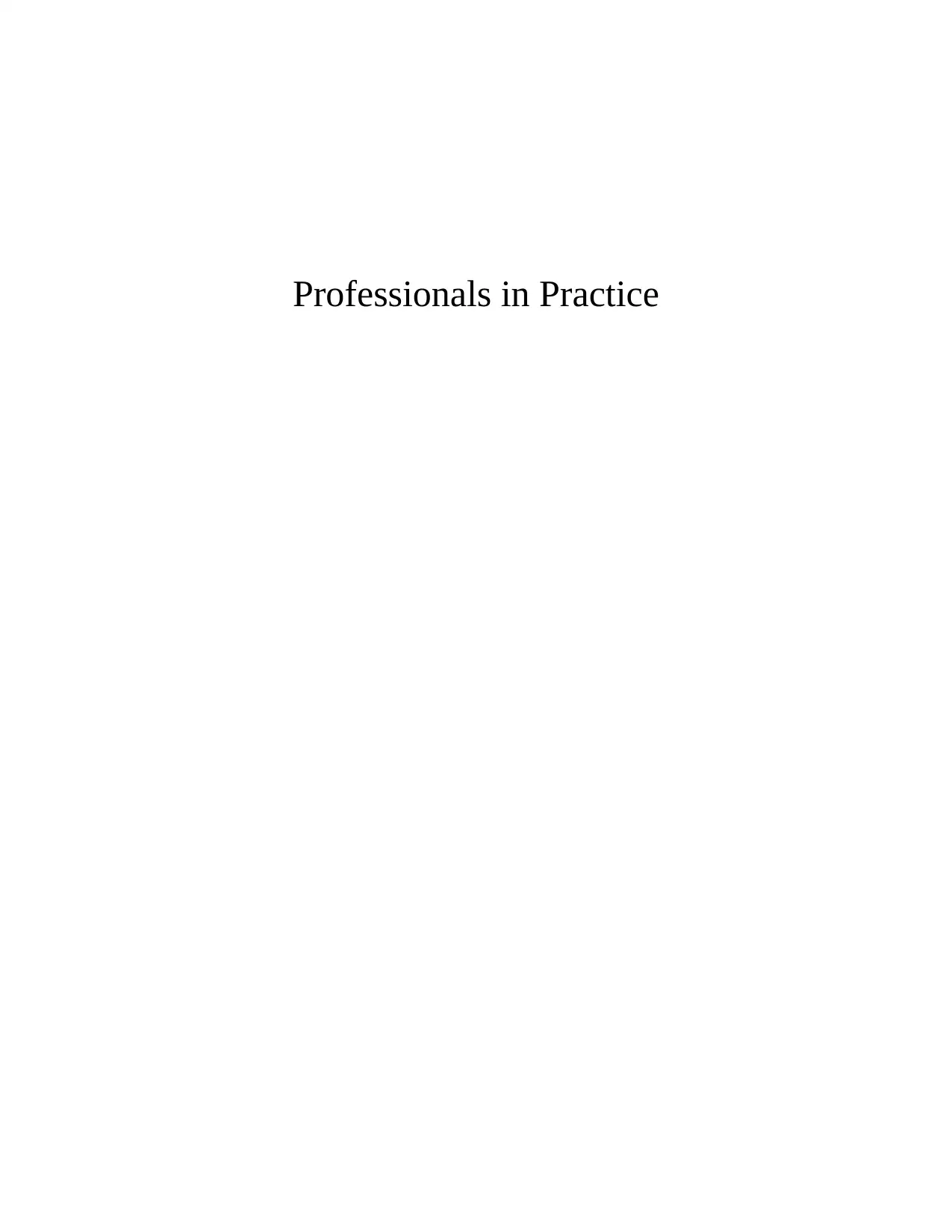
Professionals in Practice
Paraphrase This Document
Need a fresh take? Get an instant paraphrase of this document with our AI Paraphraser
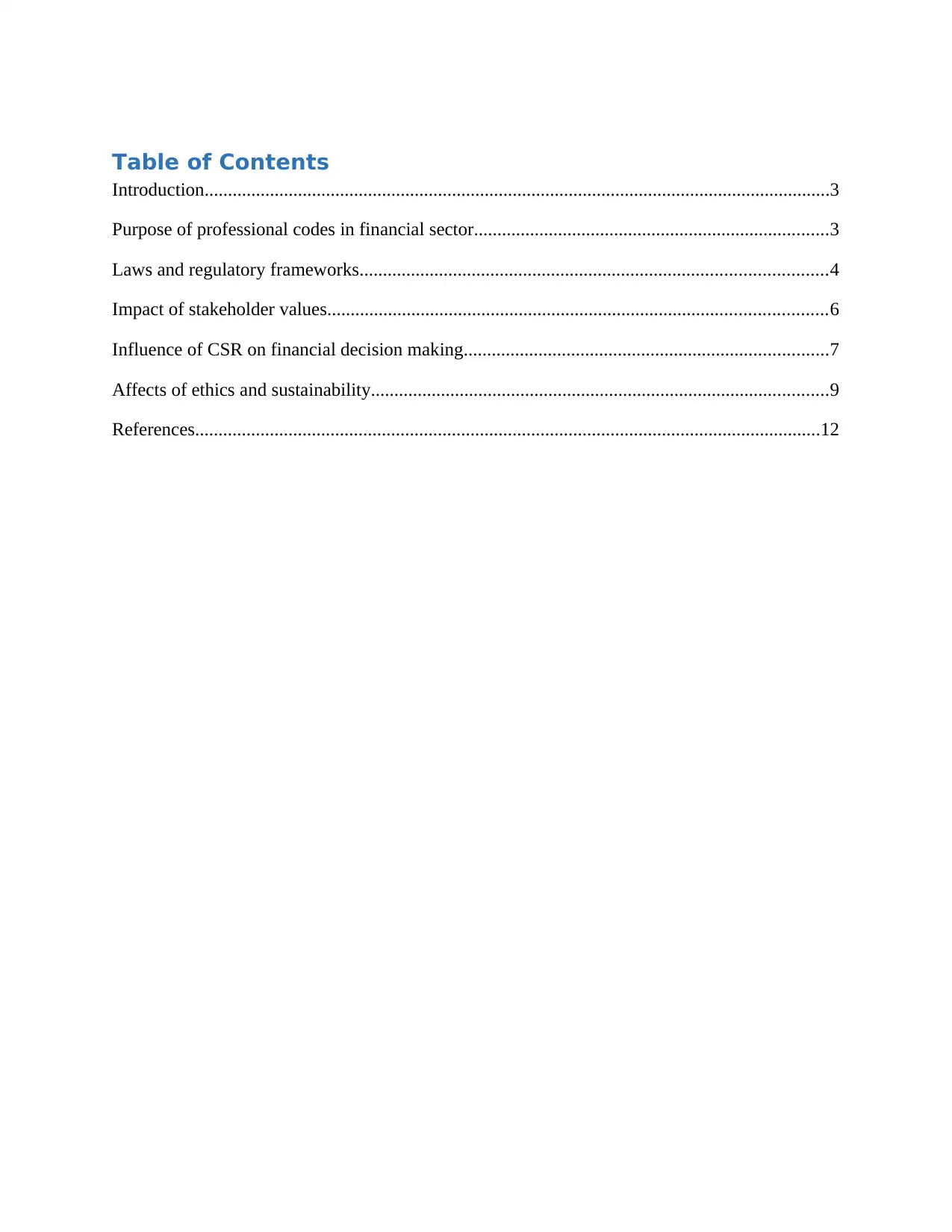
Table of Contents
Introduction......................................................................................................................................3
Purpose of professional codes in financial sector............................................................................3
Laws and regulatory frameworks....................................................................................................4
Impact of stakeholder values...........................................................................................................6
Influence of CSR on financial decision making..............................................................................7
Affects of ethics and sustainability..................................................................................................9
References......................................................................................................................................12
Introduction......................................................................................................................................3
Purpose of professional codes in financial sector............................................................................3
Laws and regulatory frameworks....................................................................................................4
Impact of stakeholder values...........................................................................................................6
Influence of CSR on financial decision making..............................................................................7
Affects of ethics and sustainability..................................................................................................9
References......................................................................................................................................12
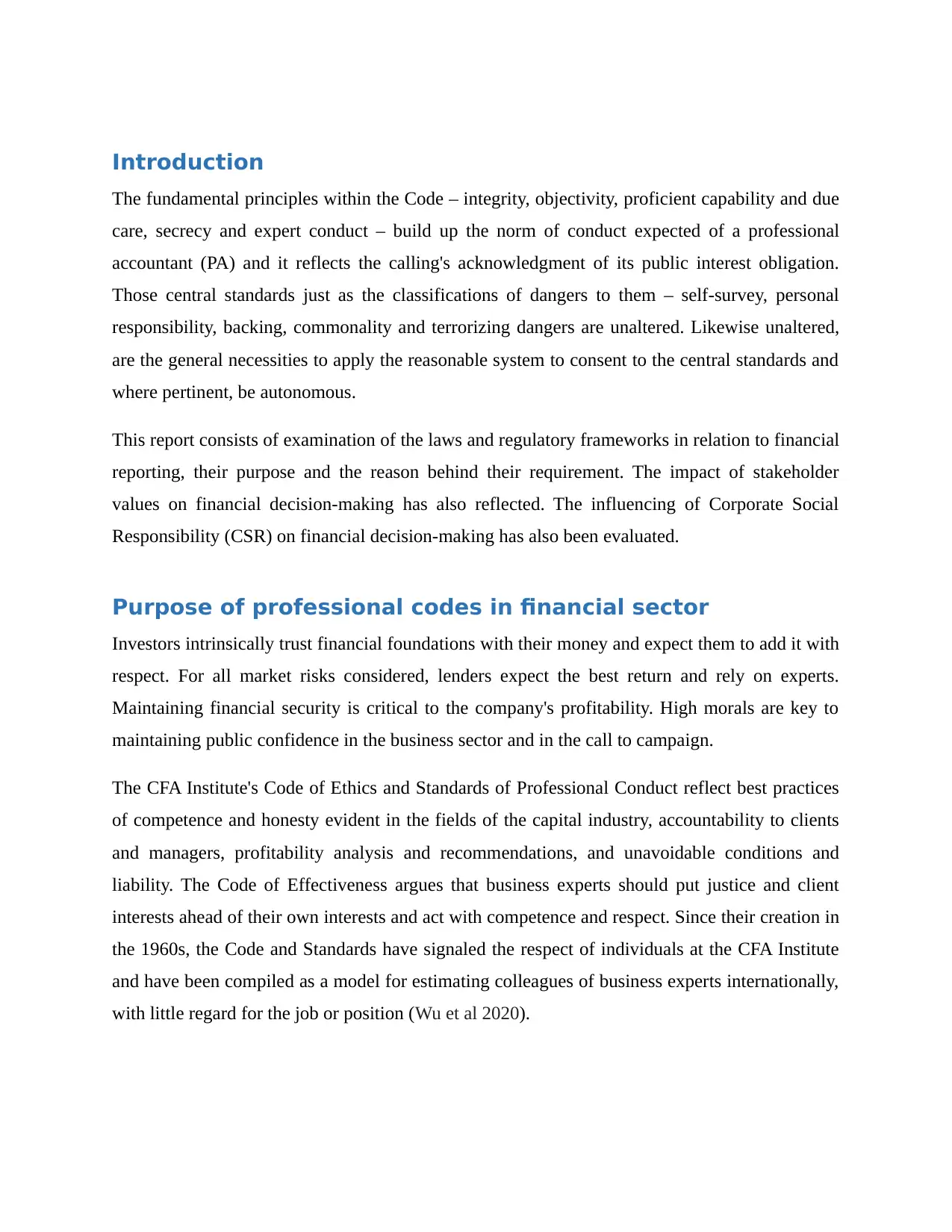
Introduction
The fundamental principles within the Code – integrity, objectivity, proficient capability and due
care, secrecy and expert conduct – build up the norm of conduct expected of a professional
accountant (PA) and it reflects the calling's acknowledgment of its public interest obligation.
Those central standards just as the classifications of dangers to them – self-survey, personal
responsibility, backing, commonality and terrorizing dangers are unaltered. Likewise unaltered,
are the general necessities to apply the reasonable system to consent to the central standards and
where pertinent, be autonomous.
This report consists of examination of the laws and regulatory frameworks in relation to financial
reporting, their purpose and the reason behind their requirement. The impact of stakeholder
values on financial decision-making has also reflected. The influencing of Corporate Social
Responsibility (CSR) on financial decision-making has also been evaluated.
Purpose of professional codes in financial sector
Investors intrinsically trust financial foundations with their money and expect them to add it with
respect. For all market risks considered, lenders expect the best return and rely on experts.
Maintaining financial security is critical to the company's profitability. High morals are key to
maintaining public confidence in the business sector and in the call to campaign.
The CFA Institute's Code of Ethics and Standards of Professional Conduct reflect best practices
of competence and honesty evident in the fields of the capital industry, accountability to clients
and managers, profitability analysis and recommendations, and unavoidable conditions and
liability. The Code of Effectiveness argues that business experts should put justice and client
interests ahead of their own interests and act with competence and respect. Since their creation in
the 1960s, the Code and Standards have signaled the respect of individuals at the CFA Institute
and have been compiled as a model for estimating colleagues of business experts internationally,
with little regard for the job or position (Wu et al 2020).
The fundamental principles within the Code – integrity, objectivity, proficient capability and due
care, secrecy and expert conduct – build up the norm of conduct expected of a professional
accountant (PA) and it reflects the calling's acknowledgment of its public interest obligation.
Those central standards just as the classifications of dangers to them – self-survey, personal
responsibility, backing, commonality and terrorizing dangers are unaltered. Likewise unaltered,
are the general necessities to apply the reasonable system to consent to the central standards and
where pertinent, be autonomous.
This report consists of examination of the laws and regulatory frameworks in relation to financial
reporting, their purpose and the reason behind their requirement. The impact of stakeholder
values on financial decision-making has also reflected. The influencing of Corporate Social
Responsibility (CSR) on financial decision-making has also been evaluated.
Purpose of professional codes in financial sector
Investors intrinsically trust financial foundations with their money and expect them to add it with
respect. For all market risks considered, lenders expect the best return and rely on experts.
Maintaining financial security is critical to the company's profitability. High morals are key to
maintaining public confidence in the business sector and in the call to campaign.
The CFA Institute's Code of Ethics and Standards of Professional Conduct reflect best practices
of competence and honesty evident in the fields of the capital industry, accountability to clients
and managers, profitability analysis and recommendations, and unavoidable conditions and
liability. The Code of Effectiveness argues that business experts should put justice and client
interests ahead of their own interests and act with competence and respect. Since their creation in
the 1960s, the Code and Standards have signaled the respect of individuals at the CFA Institute
and have been compiled as a model for estimating colleagues of business experts internationally,
with little regard for the job or position (Wu et al 2020).
⊘ This is a preview!⊘
Do you want full access?
Subscribe today to unlock all pages.

Trusted by 1+ million students worldwide
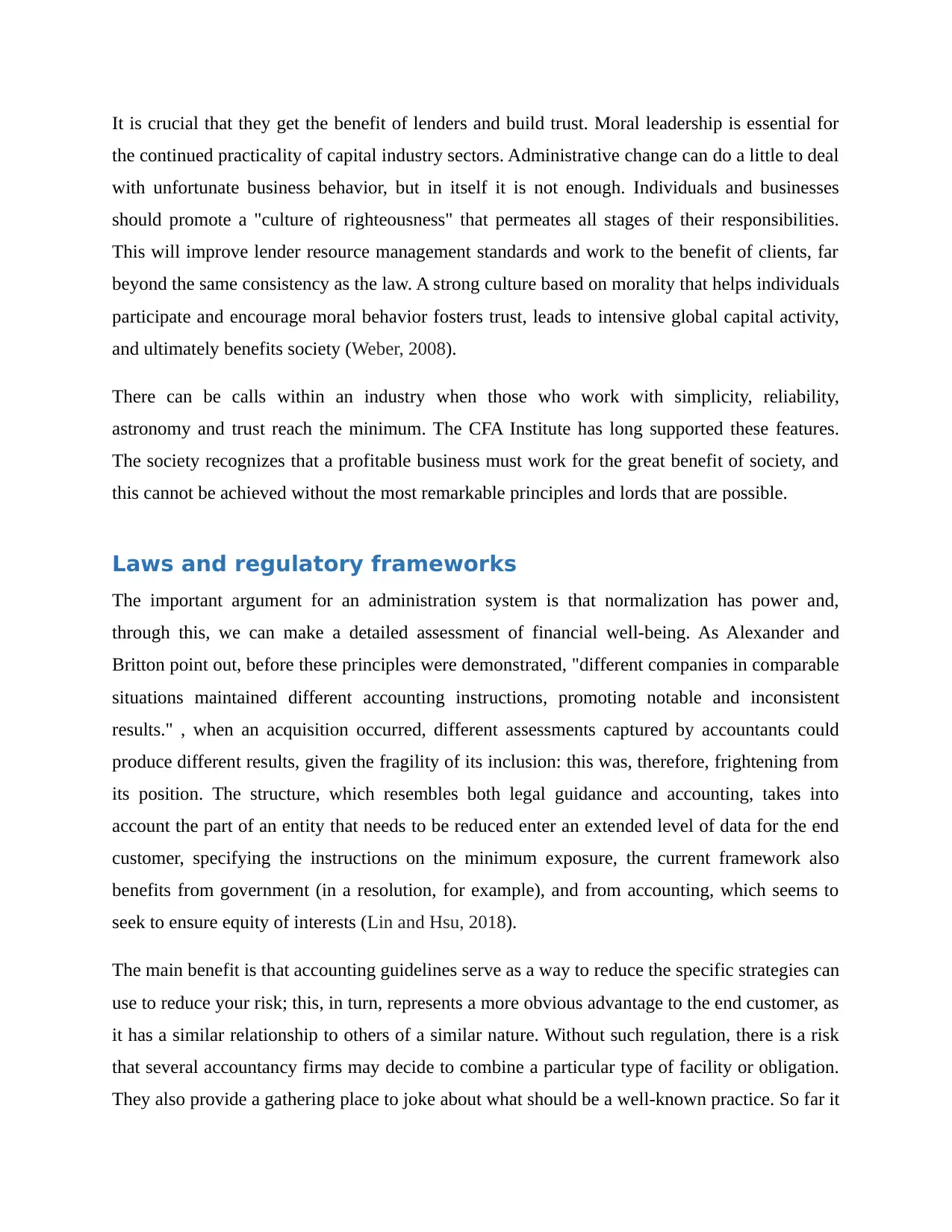
It is crucial that they get the benefit of lenders and build trust. Moral leadership is essential for
the continued practicality of capital industry sectors. Administrative change can do a little to deal
with unfortunate business behavior, but in itself it is not enough. Individuals and businesses
should promote a "culture of righteousness" that permeates all stages of their responsibilities.
This will improve lender resource management standards and work to the benefit of clients, far
beyond the same consistency as the law. A strong culture based on morality that helps individuals
participate and encourage moral behavior fosters trust, leads to intensive global capital activity,
and ultimately benefits society (Weber, 2008).
There can be calls within an industry when those who work with simplicity, reliability,
astronomy and trust reach the minimum. The CFA Institute has long supported these features.
The society recognizes that a profitable business must work for the great benefit of society, and
this cannot be achieved without the most remarkable principles and lords that are possible.
Laws and regulatory frameworks
The important argument for an administration system is that normalization has power and,
through this, we can make a detailed assessment of financial well-being. As Alexander and
Britton point out, before these principles were demonstrated, "different companies in comparable
situations maintained different accounting instructions, promoting notable and inconsistent
results." , when an acquisition occurred, different assessments captured by accountants could
produce different results, given the fragility of its inclusion: this was, therefore, frightening from
its position. The structure, which resembles both legal guidance and accounting, takes into
account the part of an entity that needs to be reduced enter an extended level of data for the end
customer, specifying the instructions on the minimum exposure, the current framework also
benefits from government (in a resolution, for example), and from accounting, which seems to
seek to ensure equity of interests (Lin and Hsu, 2018).
The main benefit is that accounting guidelines serve as a way to reduce the specific strategies can
use to reduce your risk; this, in turn, represents a more obvious advantage to the end customer, as
it has a similar relationship to others of a similar nature. Without such regulation, there is a risk
that several accountancy firms may decide to combine a particular type of facility or obligation.
They also provide a gathering place to joke about what should be a well-known practice. So far it
the continued practicality of capital industry sectors. Administrative change can do a little to deal
with unfortunate business behavior, but in itself it is not enough. Individuals and businesses
should promote a "culture of righteousness" that permeates all stages of their responsibilities.
This will improve lender resource management standards and work to the benefit of clients, far
beyond the same consistency as the law. A strong culture based on morality that helps individuals
participate and encourage moral behavior fosters trust, leads to intensive global capital activity,
and ultimately benefits society (Weber, 2008).
There can be calls within an industry when those who work with simplicity, reliability,
astronomy and trust reach the minimum. The CFA Institute has long supported these features.
The society recognizes that a profitable business must work for the great benefit of society, and
this cannot be achieved without the most remarkable principles and lords that are possible.
Laws and regulatory frameworks
The important argument for an administration system is that normalization has power and,
through this, we can make a detailed assessment of financial well-being. As Alexander and
Britton point out, before these principles were demonstrated, "different companies in comparable
situations maintained different accounting instructions, promoting notable and inconsistent
results." , when an acquisition occurred, different assessments captured by accountants could
produce different results, given the fragility of its inclusion: this was, therefore, frightening from
its position. The structure, which resembles both legal guidance and accounting, takes into
account the part of an entity that needs to be reduced enter an extended level of data for the end
customer, specifying the instructions on the minimum exposure, the current framework also
benefits from government (in a resolution, for example), and from accounting, which seems to
seek to ensure equity of interests (Lin and Hsu, 2018).
The main benefit is that accounting guidelines serve as a way to reduce the specific strategies can
use to reduce your risk; this, in turn, represents a more obvious advantage to the end customer, as
it has a similar relationship to others of a similar nature. Without such regulation, there is a risk
that several accountancy firms may decide to combine a particular type of facility or obligation.
They also provide a gathering place to joke about what should be a well-known practice. So far it
Paraphrase This Document
Need a fresh take? Get an instant paraphrase of this document with our AI Paraphraser
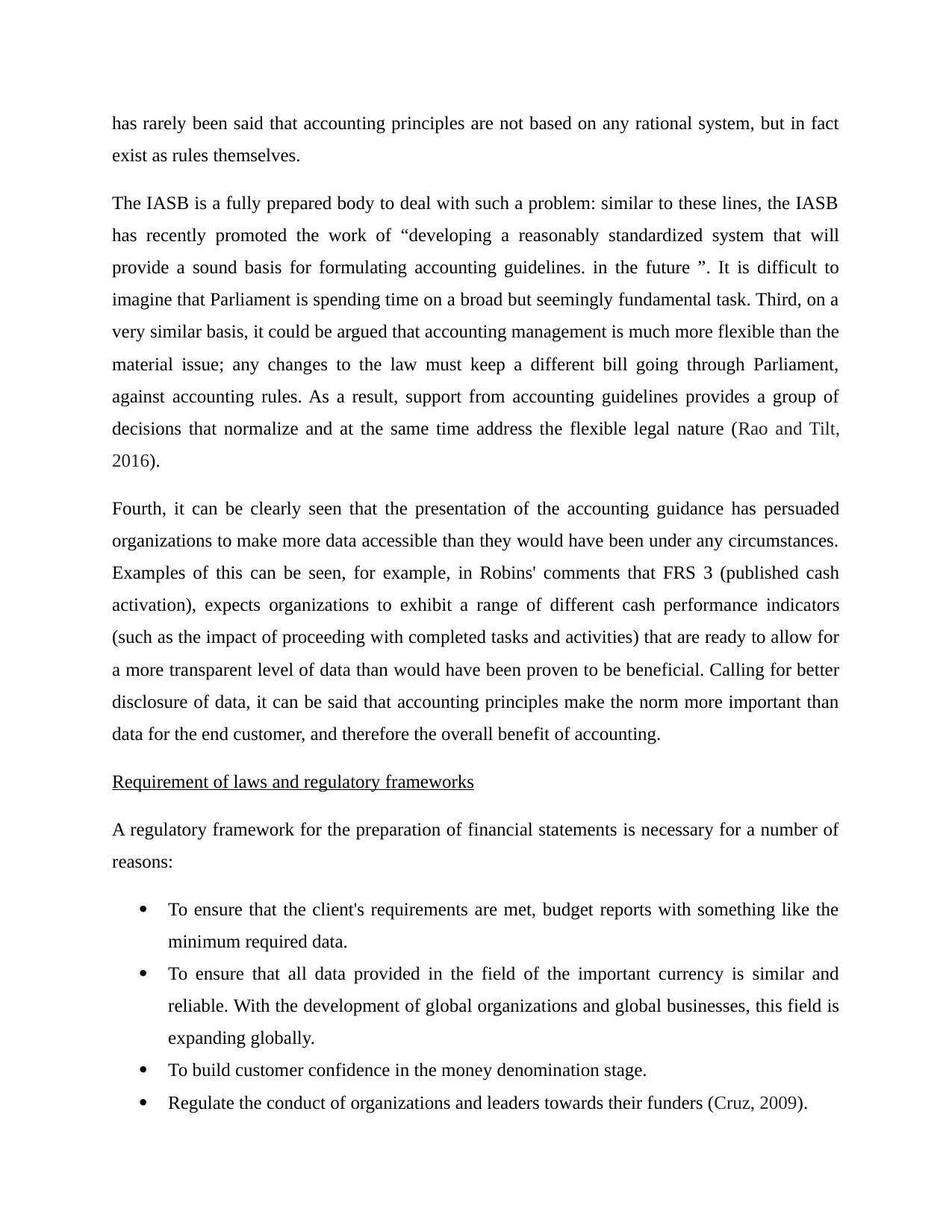
has rarely been said that accounting principles are not based on any rational system, but in fact
exist as rules themselves.
The IASB is a fully prepared body to deal with such a problem: similar to these lines, the IASB
has recently promoted the work of “developing a reasonably standardized system that will
provide a sound basis for formulating accounting guidelines. in the future ”. It is difficult to
imagine that Parliament is spending time on a broad but seemingly fundamental task. Third, on a
very similar basis, it could be argued that accounting management is much more flexible than the
material issue; any changes to the law must keep a different bill going through Parliament,
against accounting rules. As a result, support from accounting guidelines provides a group of
decisions that normalize and at the same time address the flexible legal nature (Rao and Tilt,
2016).
Fourth, it can be clearly seen that the presentation of the accounting guidance has persuaded
organizations to make more data accessible than they would have been under any circumstances.
Examples of this can be seen, for example, in Robins' comments that FRS 3 (published cash
activation), expects organizations to exhibit a range of different cash performance indicators
(such as the impact of proceeding with completed tasks and activities) that are ready to allow for
a more transparent level of data than would have been proven to be beneficial. Calling for better
disclosure of data, it can be said that accounting principles make the norm more important than
data for the end customer, and therefore the overall benefit of accounting.
Requirement of laws and regulatory frameworks
A regulatory framework for the preparation of financial statements is necessary for a number of
reasons:
To ensure that the client's requirements are met, budget reports with something like the
minimum required data.
To ensure that all data provided in the field of the important currency is similar and
reliable. With the development of global organizations and global businesses, this field is
expanding globally.
To build customer confidence in the money denomination stage.
Regulate the conduct of organizations and leaders towards their funders (Cruz, 2009).
exist as rules themselves.
The IASB is a fully prepared body to deal with such a problem: similar to these lines, the IASB
has recently promoted the work of “developing a reasonably standardized system that will
provide a sound basis for formulating accounting guidelines. in the future ”. It is difficult to
imagine that Parliament is spending time on a broad but seemingly fundamental task. Third, on a
very similar basis, it could be argued that accounting management is much more flexible than the
material issue; any changes to the law must keep a different bill going through Parliament,
against accounting rules. As a result, support from accounting guidelines provides a group of
decisions that normalize and at the same time address the flexible legal nature (Rao and Tilt,
2016).
Fourth, it can be clearly seen that the presentation of the accounting guidance has persuaded
organizations to make more data accessible than they would have been under any circumstances.
Examples of this can be seen, for example, in Robins' comments that FRS 3 (published cash
activation), expects organizations to exhibit a range of different cash performance indicators
(such as the impact of proceeding with completed tasks and activities) that are ready to allow for
a more transparent level of data than would have been proven to be beneficial. Calling for better
disclosure of data, it can be said that accounting principles make the norm more important than
data for the end customer, and therefore the overall benefit of accounting.
Requirement of laws and regulatory frameworks
A regulatory framework for the preparation of financial statements is necessary for a number of
reasons:
To ensure that the client's requirements are met, budget reports with something like the
minimum required data.
To ensure that all data provided in the field of the important currency is similar and
reliable. With the development of global organizations and global businesses, this field is
expanding globally.
To build customer confidence in the money denomination stage.
Regulate the conduct of organizations and leaders towards their funders (Cruz, 2009).
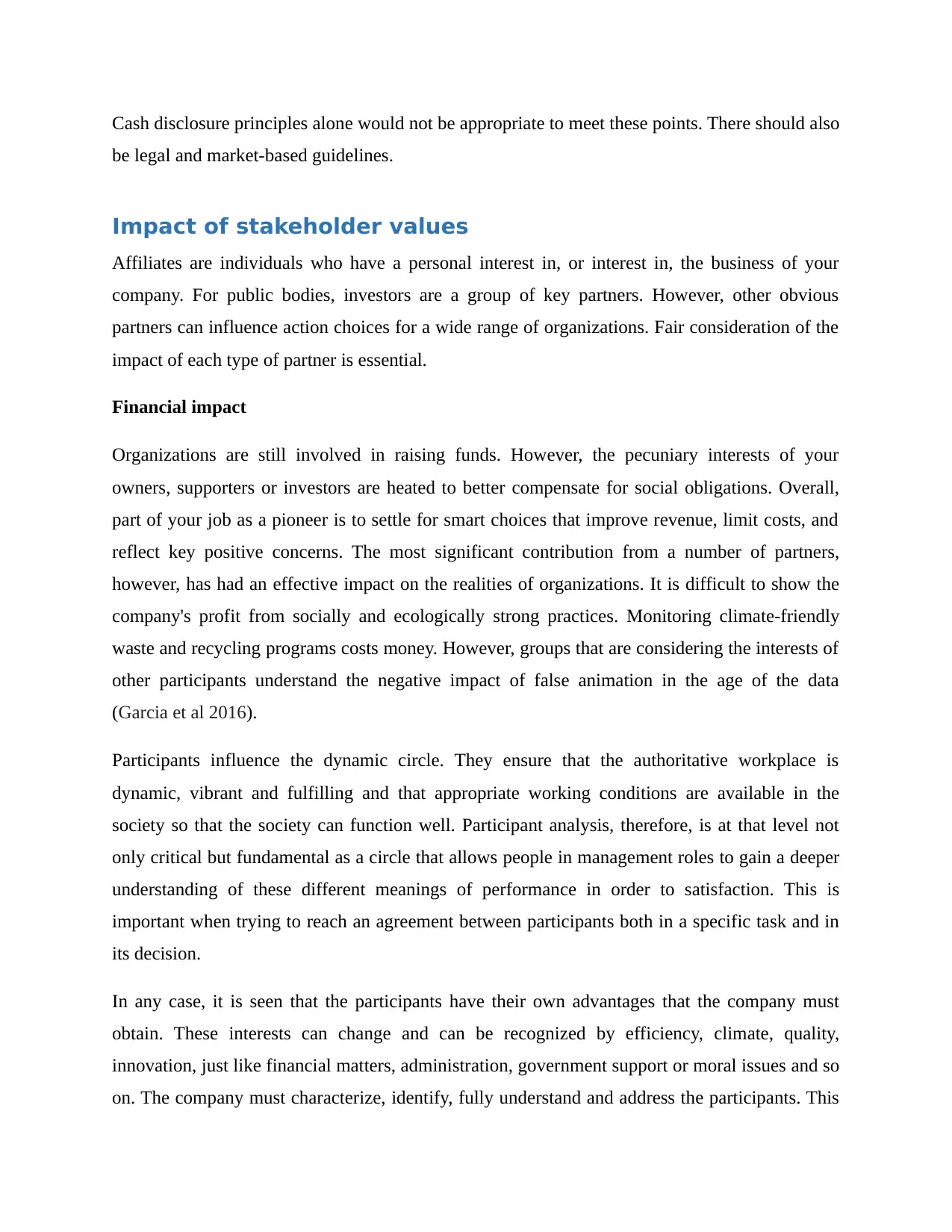
Cash disclosure principles alone would not be appropriate to meet these points. There should also
be legal and market-based guidelines.
Impact of stakeholder values
Affiliates are individuals who have a personal interest in, or interest in, the business of your
company. For public bodies, investors are a group of key partners. However, other obvious
partners can influence action choices for a wide range of organizations. Fair consideration of the
impact of each type of partner is essential.
Financial impact
Organizations are still involved in raising funds. However, the pecuniary interests of your
owners, supporters or investors are heated to better compensate for social obligations. Overall,
part of your job as a pioneer is to settle for smart choices that improve revenue, limit costs, and
reflect key positive concerns. The most significant contribution from a number of partners,
however, has had an effective impact on the realities of organizations. It is difficult to show the
company's profit from socially and ecologically strong practices. Monitoring climate-friendly
waste and recycling programs costs money. However, groups that are considering the interests of
other participants understand the negative impact of false animation in the age of the data
(Garcia et al 2016).
Participants influence the dynamic circle. They ensure that the authoritative workplace is
dynamic, vibrant and fulfilling and that appropriate working conditions are available in the
society so that the society can function well. Participant analysis, therefore, is at that level not
only critical but fundamental as a circle that allows people in management roles to gain a deeper
understanding of these different meanings of performance in order to satisfaction. This is
important when trying to reach an agreement between participants both in a specific task and in
its decision.
In any case, it is seen that the participants have their own advantages that the company must
obtain. These interests can change and can be recognized by efficiency, climate, quality,
innovation, just like financial matters, administration, government support or moral issues and so
on. The company must characterize, identify, fully understand and address the participants. This
be legal and market-based guidelines.
Impact of stakeholder values
Affiliates are individuals who have a personal interest in, or interest in, the business of your
company. For public bodies, investors are a group of key partners. However, other obvious
partners can influence action choices for a wide range of organizations. Fair consideration of the
impact of each type of partner is essential.
Financial impact
Organizations are still involved in raising funds. However, the pecuniary interests of your
owners, supporters or investors are heated to better compensate for social obligations. Overall,
part of your job as a pioneer is to settle for smart choices that improve revenue, limit costs, and
reflect key positive concerns. The most significant contribution from a number of partners,
however, has had an effective impact on the realities of organizations. It is difficult to show the
company's profit from socially and ecologically strong practices. Monitoring climate-friendly
waste and recycling programs costs money. However, groups that are considering the interests of
other participants understand the negative impact of false animation in the age of the data
(Garcia et al 2016).
Participants influence the dynamic circle. They ensure that the authoritative workplace is
dynamic, vibrant and fulfilling and that appropriate working conditions are available in the
society so that the society can function well. Participant analysis, therefore, is at that level not
only critical but fundamental as a circle that allows people in management roles to gain a deeper
understanding of these different meanings of performance in order to satisfaction. This is
important when trying to reach an agreement between participants both in a specific task and in
its decision.
In any case, it is seen that the participants have their own advantages that the company must
obtain. These interests can change and can be recognized by efficiency, climate, quality,
innovation, just like financial matters, administration, government support or moral issues and so
on. The company must characterize, identify, fully understand and address the participants. This
⊘ This is a preview!⊘
Do you want full access?
Subscribe today to unlock all pages.

Trusted by 1+ million students worldwide
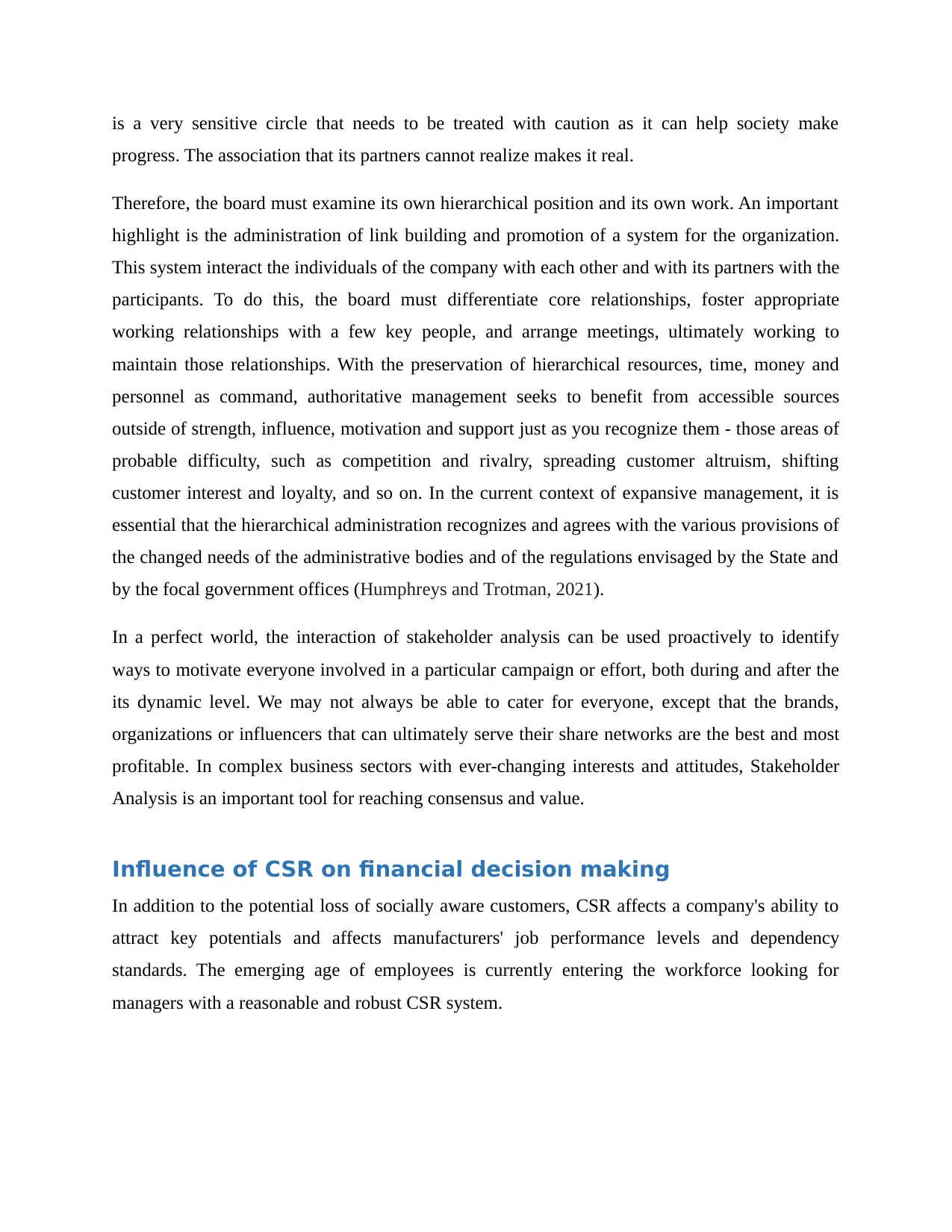
is a very sensitive circle that needs to be treated with caution as it can help society make
progress. The association that its partners cannot realize makes it real.
Therefore, the board must examine its own hierarchical position and its own work. An important
highlight is the administration of link building and promotion of a system for the organization.
This system interact the individuals of the company with each other and with its partners with the
participants. To do this, the board must differentiate core relationships, foster appropriate
working relationships with a few key people, and arrange meetings, ultimately working to
maintain those relationships. With the preservation of hierarchical resources, time, money and
personnel as command, authoritative management seeks to benefit from accessible sources
outside of strength, influence, motivation and support just as you recognize them - those areas of
probable difficulty, such as competition and rivalry, spreading customer altruism, shifting
customer interest and loyalty, and so on. In the current context of expansive management, it is
essential that the hierarchical administration recognizes and agrees with the various provisions of
the changed needs of the administrative bodies and of the regulations envisaged by the State and
by the focal government offices (Humphreys and Trotman, 2021).
In a perfect world, the interaction of stakeholder analysis can be used proactively to identify
ways to motivate everyone involved in a particular campaign or effort, both during and after the
its dynamic level. We may not always be able to cater for everyone, except that the brands,
organizations or influencers that can ultimately serve their share networks are the best and most
profitable. In complex business sectors with ever-changing interests and attitudes, Stakeholder
Analysis is an important tool for reaching consensus and value.
Influence of CSR on financial decision making
In addition to the potential loss of socially aware customers, CSR affects a company's ability to
attract key potentials and affects manufacturers' job performance levels and dependency
standards. The emerging age of employees is currently entering the workforce looking for
managers with a reasonable and robust CSR system.
progress. The association that its partners cannot realize makes it real.
Therefore, the board must examine its own hierarchical position and its own work. An important
highlight is the administration of link building and promotion of a system for the organization.
This system interact the individuals of the company with each other and with its partners with the
participants. To do this, the board must differentiate core relationships, foster appropriate
working relationships with a few key people, and arrange meetings, ultimately working to
maintain those relationships. With the preservation of hierarchical resources, time, money and
personnel as command, authoritative management seeks to benefit from accessible sources
outside of strength, influence, motivation and support just as you recognize them - those areas of
probable difficulty, such as competition and rivalry, spreading customer altruism, shifting
customer interest and loyalty, and so on. In the current context of expansive management, it is
essential that the hierarchical administration recognizes and agrees with the various provisions of
the changed needs of the administrative bodies and of the regulations envisaged by the State and
by the focal government offices (Humphreys and Trotman, 2021).
In a perfect world, the interaction of stakeholder analysis can be used proactively to identify
ways to motivate everyone involved in a particular campaign or effort, both during and after the
its dynamic level. We may not always be able to cater for everyone, except that the brands,
organizations or influencers that can ultimately serve their share networks are the best and most
profitable. In complex business sectors with ever-changing interests and attitudes, Stakeholder
Analysis is an important tool for reaching consensus and value.
Influence of CSR on financial decision making
In addition to the potential loss of socially aware customers, CSR affects a company's ability to
attract key potentials and affects manufacturers' job performance levels and dependency
standards. The emerging age of employees is currently entering the workforce looking for
managers with a reasonable and robust CSR system.
Paraphrase This Document
Need a fresh take? Get an instant paraphrase of this document with our AI Paraphraser
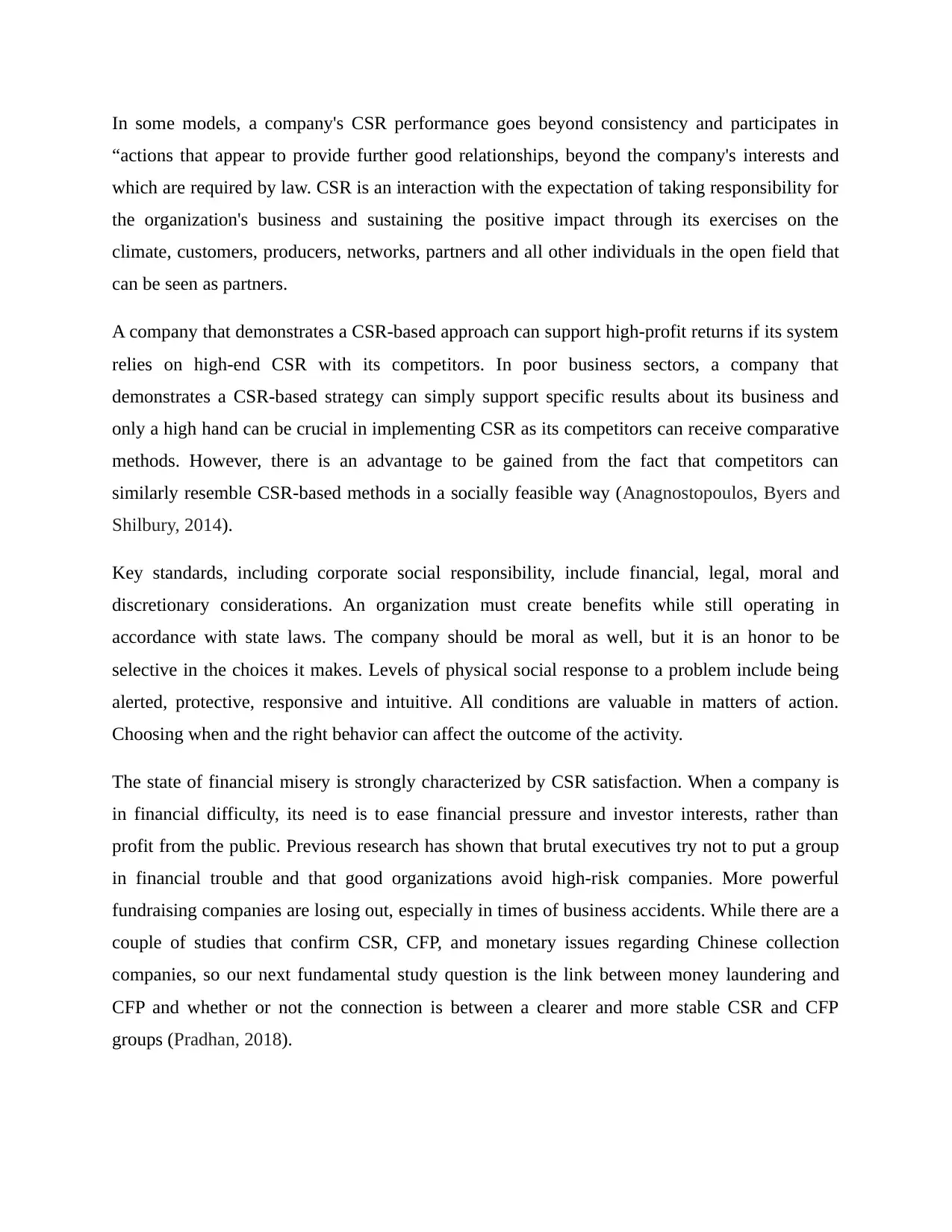
In some models, a company's CSR performance goes beyond consistency and participates in
“actions that appear to provide further good relationships, beyond the company's interests and
which are required by law. CSR is an interaction with the expectation of taking responsibility for
the organization's business and sustaining the positive impact through its exercises on the
climate, customers, producers, networks, partners and all other individuals in the open field that
can be seen as partners.
A company that demonstrates a CSR-based approach can support high-profit returns if its system
relies on high-end CSR with its competitors. In poor business sectors, a company that
demonstrates a CSR-based strategy can simply support specific results about its business and
only a high hand can be crucial in implementing CSR as its competitors can receive comparative
methods. However, there is an advantage to be gained from the fact that competitors can
similarly resemble CSR-based methods in a socially feasible way (Anagnostopoulos, Byers and
Shilbury, 2014).
Key standards, including corporate social responsibility, include financial, legal, moral and
discretionary considerations. An organization must create benefits while still operating in
accordance with state laws. The company should be moral as well, but it is an honor to be
selective in the choices it makes. Levels of physical social response to a problem include being
alerted, protective, responsive and intuitive. All conditions are valuable in matters of action.
Choosing when and the right behavior can affect the outcome of the activity.
The state of financial misery is strongly characterized by CSR satisfaction. When a company is
in financial difficulty, its need is to ease financial pressure and investor interests, rather than
profit from the public. Previous research has shown that brutal executives try not to put a group
in financial trouble and that good organizations avoid high-risk companies. More powerful
fundraising companies are losing out, especially in times of business accidents. While there are a
couple of studies that confirm CSR, CFP, and monetary issues regarding Chinese collection
companies, so our next fundamental study question is the link between money laundering and
CFP and whether or not the connection is between a clearer and more stable CSR and CFP
groups (Pradhan, 2018).
“actions that appear to provide further good relationships, beyond the company's interests and
which are required by law. CSR is an interaction with the expectation of taking responsibility for
the organization's business and sustaining the positive impact through its exercises on the
climate, customers, producers, networks, partners and all other individuals in the open field that
can be seen as partners.
A company that demonstrates a CSR-based approach can support high-profit returns if its system
relies on high-end CSR with its competitors. In poor business sectors, a company that
demonstrates a CSR-based strategy can simply support specific results about its business and
only a high hand can be crucial in implementing CSR as its competitors can receive comparative
methods. However, there is an advantage to be gained from the fact that competitors can
similarly resemble CSR-based methods in a socially feasible way (Anagnostopoulos, Byers and
Shilbury, 2014).
Key standards, including corporate social responsibility, include financial, legal, moral and
discretionary considerations. An organization must create benefits while still operating in
accordance with state laws. The company should be moral as well, but it is an honor to be
selective in the choices it makes. Levels of physical social response to a problem include being
alerted, protective, responsive and intuitive. All conditions are valuable in matters of action.
Choosing when and the right behavior can affect the outcome of the activity.
The state of financial misery is strongly characterized by CSR satisfaction. When a company is
in financial difficulty, its need is to ease financial pressure and investor interests, rather than
profit from the public. Previous research has shown that brutal executives try not to put a group
in financial trouble and that good organizations avoid high-risk companies. More powerful
fundraising companies are losing out, especially in times of business accidents. While there are a
couple of studies that confirm CSR, CFP, and monetary issues regarding Chinese collection
companies, so our next fundamental study question is the link between money laundering and
CFP and whether or not the connection is between a clearer and more stable CSR and CFP
groups (Pradhan, 2018).
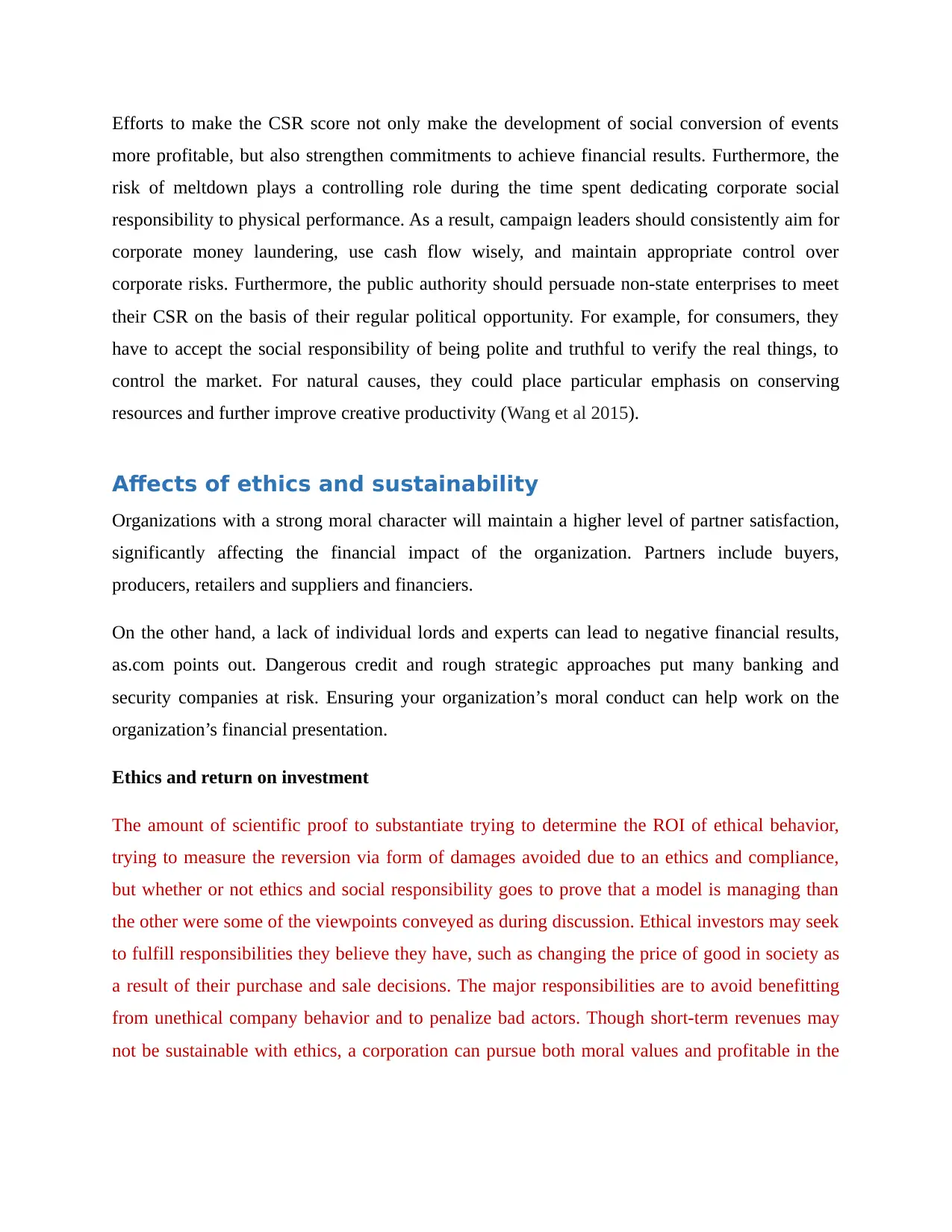
Efforts to make the CSR score not only make the development of social conversion of events
more profitable, but also strengthen commitments to achieve financial results. Furthermore, the
risk of meltdown plays a controlling role during the time spent dedicating corporate social
responsibility to physical performance. As a result, campaign leaders should consistently aim for
corporate money laundering, use cash flow wisely, and maintain appropriate control over
corporate risks. Furthermore, the public authority should persuade non-state enterprises to meet
their CSR on the basis of their regular political opportunity. For example, for consumers, they
have to accept the social responsibility of being polite and truthful to verify the real things, to
control the market. For natural causes, they could place particular emphasis on conserving
resources and further improve creative productivity (Wang et al 2015).
Affects of ethics and sustainability
Organizations with a strong moral character will maintain a higher level of partner satisfaction,
significantly affecting the financial impact of the organization. Partners include buyers,
producers, retailers and suppliers and financiers.
On the other hand, a lack of individual lords and experts can lead to negative financial results,
as.com points out. Dangerous credit and rough strategic approaches put many banking and
security companies at risk. Ensuring your organization’s moral conduct can help work on the
organization’s financial presentation.
Ethics and return on investment
The amount of scientific proof to substantiate trying to determine the ROI of ethical behavior,
trying to measure the reversion via form of damages avoided due to an ethics and compliance,
but whether or not ethics and social responsibility goes to prove that a model is managing than
the other were some of the viewpoints conveyed as during discussion. Ethical investors may seek
to fulfill responsibilities they believe they have, such as changing the price of good in society as
a result of their purchase and sale decisions. The major responsibilities are to avoid benefitting
from unethical company behavior and to penalize bad actors. Though short-term revenues may
not be sustainable with ethics, a corporation can pursue both moral values and profitable in the
more profitable, but also strengthen commitments to achieve financial results. Furthermore, the
risk of meltdown plays a controlling role during the time spent dedicating corporate social
responsibility to physical performance. As a result, campaign leaders should consistently aim for
corporate money laundering, use cash flow wisely, and maintain appropriate control over
corporate risks. Furthermore, the public authority should persuade non-state enterprises to meet
their CSR on the basis of their regular political opportunity. For example, for consumers, they
have to accept the social responsibility of being polite and truthful to verify the real things, to
control the market. For natural causes, they could place particular emphasis on conserving
resources and further improve creative productivity (Wang et al 2015).
Affects of ethics and sustainability
Organizations with a strong moral character will maintain a higher level of partner satisfaction,
significantly affecting the financial impact of the organization. Partners include buyers,
producers, retailers and suppliers and financiers.
On the other hand, a lack of individual lords and experts can lead to negative financial results,
as.com points out. Dangerous credit and rough strategic approaches put many banking and
security companies at risk. Ensuring your organization’s moral conduct can help work on the
organization’s financial presentation.
Ethics and return on investment
The amount of scientific proof to substantiate trying to determine the ROI of ethical behavior,
trying to measure the reversion via form of damages avoided due to an ethics and compliance,
but whether or not ethics and social responsibility goes to prove that a model is managing than
the other were some of the viewpoints conveyed as during discussion. Ethical investors may seek
to fulfill responsibilities they believe they have, such as changing the price of good in society as
a result of their purchase and sale decisions. The major responsibilities are to avoid benefitting
from unethical company behavior and to penalize bad actors. Though short-term revenues may
not be sustainable with ethics, a corporation can pursue both moral values and profitable in the
⊘ This is a preview!⊘
Do you want full access?
Subscribe today to unlock all pages.

Trusted by 1+ million students worldwide
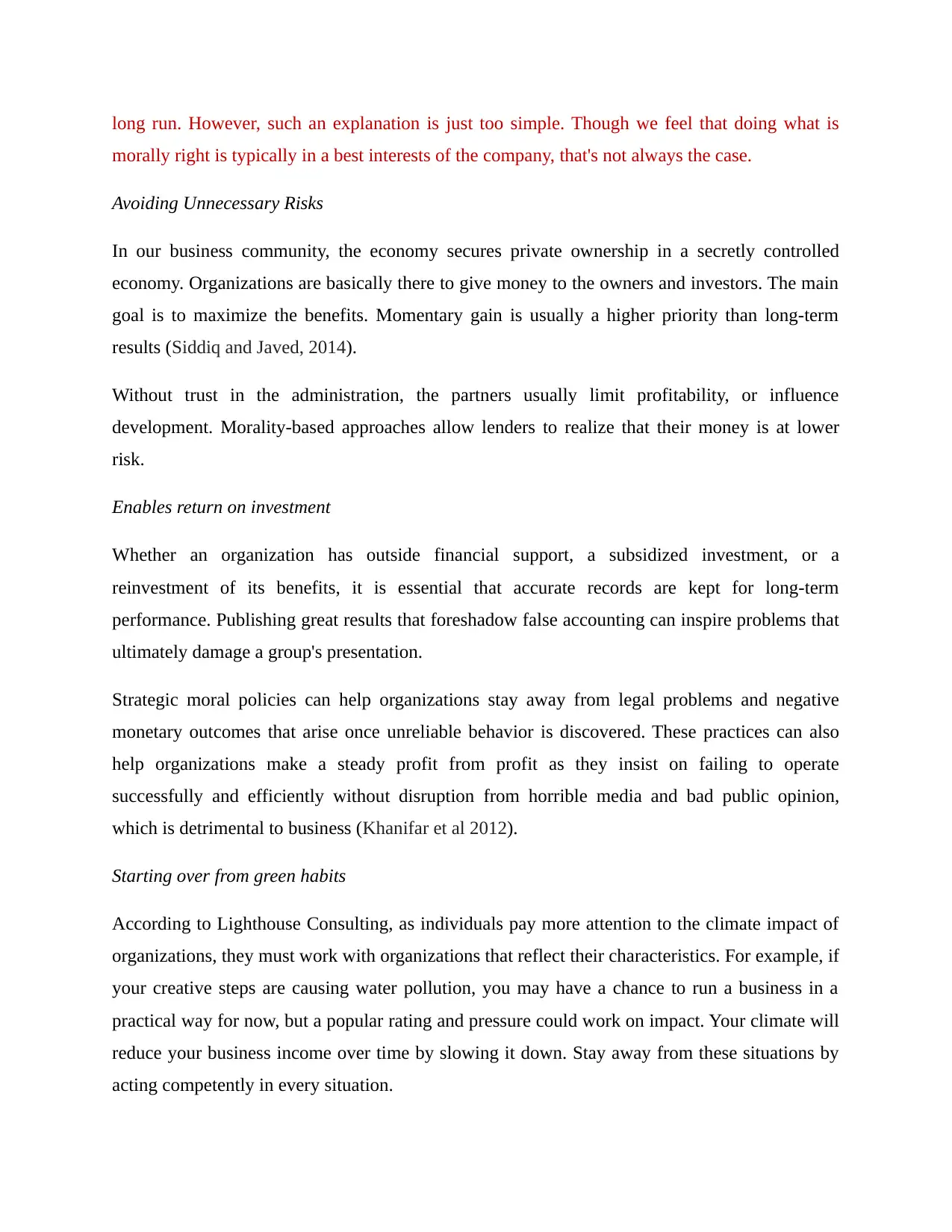
long run. However, such an explanation is just too simple. Though we feel that doing what is
morally right is typically in a best interests of the company, that's not always the case.
Avoiding Unnecessary Risks
In our business community, the economy secures private ownership in a secretly controlled
economy. Organizations are basically there to give money to the owners and investors. The main
goal is to maximize the benefits. Momentary gain is usually a higher priority than long-term
results (Siddiq and Javed, 2014).
Without trust in the administration, the partners usually limit profitability, or influence
development. Morality-based approaches allow lenders to realize that their money is at lower
risk.
Enables return on investment
Whether an organization has outside financial support, a subsidized investment, or a
reinvestment of its benefits, it is essential that accurate records are kept for long-term
performance. Publishing great results that foreshadow false accounting can inspire problems that
ultimately damage a group's presentation.
Strategic moral policies can help organizations stay away from legal problems and negative
monetary outcomes that arise once unreliable behavior is discovered. These practices can also
help organizations make a steady profit from profit as they insist on failing to operate
successfully and efficiently without disruption from horrible media and bad public opinion,
which is detrimental to business (Khanifar et al 2012).
Starting over from green habits
According to Lighthouse Consulting, as individuals pay more attention to the climate impact of
organizations, they must work with organizations that reflect their characteristics. For example, if
your creative steps are causing water pollution, you may have a chance to run a business in a
practical way for now, but a popular rating and pressure could work on impact. Your climate will
reduce your business income over time by slowing it down. Stay away from these situations by
acting competently in every situation.
morally right is typically in a best interests of the company, that's not always the case.
Avoiding Unnecessary Risks
In our business community, the economy secures private ownership in a secretly controlled
economy. Organizations are basically there to give money to the owners and investors. The main
goal is to maximize the benefits. Momentary gain is usually a higher priority than long-term
results (Siddiq and Javed, 2014).
Without trust in the administration, the partners usually limit profitability, or influence
development. Morality-based approaches allow lenders to realize that their money is at lower
risk.
Enables return on investment
Whether an organization has outside financial support, a subsidized investment, or a
reinvestment of its benefits, it is essential that accurate records are kept for long-term
performance. Publishing great results that foreshadow false accounting can inspire problems that
ultimately damage a group's presentation.
Strategic moral policies can help organizations stay away from legal problems and negative
monetary outcomes that arise once unreliable behavior is discovered. These practices can also
help organizations make a steady profit from profit as they insist on failing to operate
successfully and efficiently without disruption from horrible media and bad public opinion,
which is detrimental to business (Khanifar et al 2012).
Starting over from green habits
According to Lighthouse Consulting, as individuals pay more attention to the climate impact of
organizations, they must work with organizations that reflect their characteristics. For example, if
your creative steps are causing water pollution, you may have a chance to run a business in a
practical way for now, but a popular rating and pressure could work on impact. Your climate will
reduce your business income over time by slowing it down. Stay away from these situations by
acting competently in every situation.
Paraphrase This Document
Need a fresh take? Get an instant paraphrase of this document with our AI Paraphraser
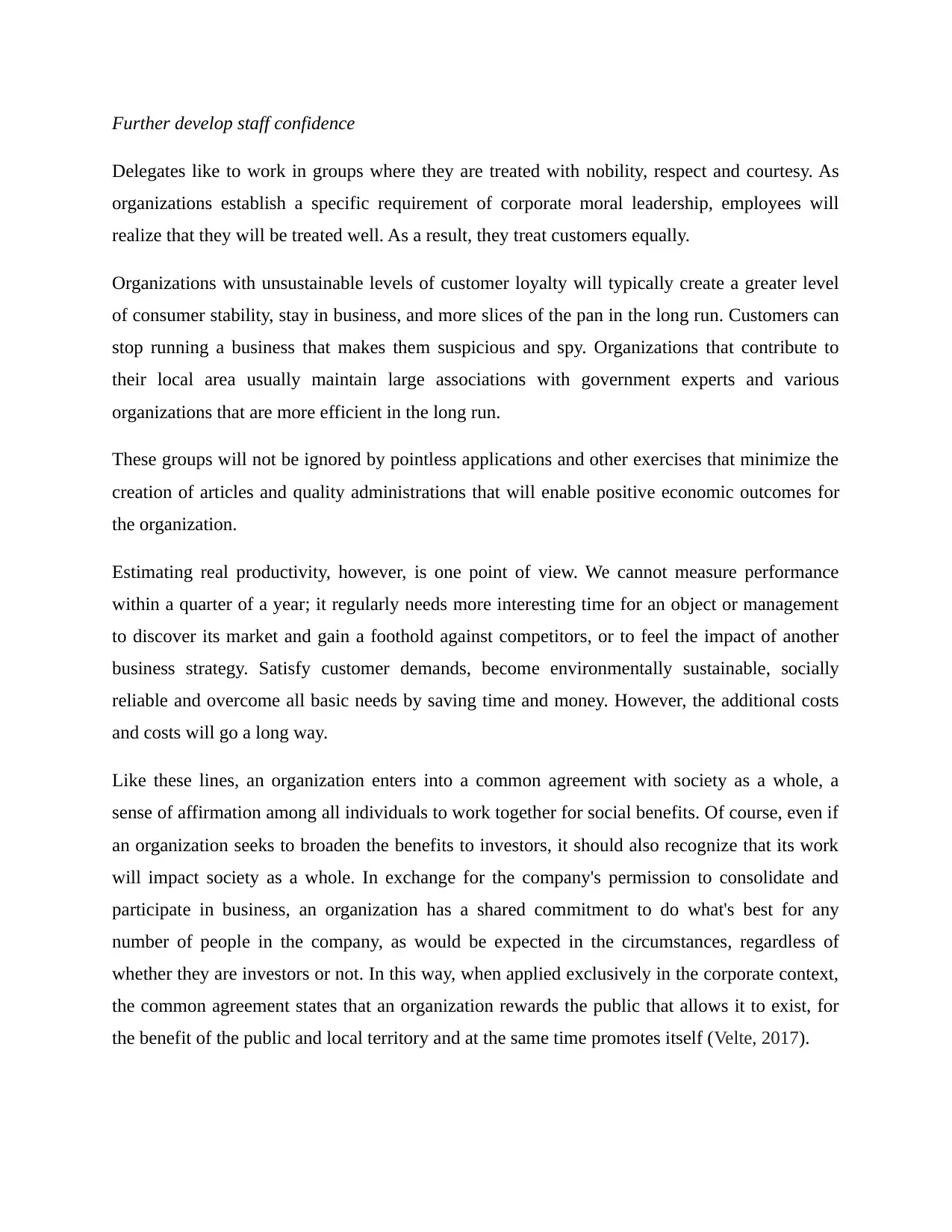
Further develop staff confidence
Delegates like to work in groups where they are treated with nobility, respect and courtesy. As
organizations establish a specific requirement of corporate moral leadership, employees will
realize that they will be treated well. As a result, they treat customers equally.
Organizations with unsustainable levels of customer loyalty will typically create a greater level
of consumer stability, stay in business, and more slices of the pan in the long run. Customers can
stop running a business that makes them suspicious and spy. Organizations that contribute to
their local area usually maintain large associations with government experts and various
organizations that are more efficient in the long run.
These groups will not be ignored by pointless applications and other exercises that minimize the
creation of articles and quality administrations that will enable positive economic outcomes for
the organization.
Estimating real productivity, however, is one point of view. We cannot measure performance
within a quarter of a year; it regularly needs more interesting time for an object or management
to discover its market and gain a foothold against competitors, or to feel the impact of another
business strategy. Satisfy customer demands, become environmentally sustainable, socially
reliable and overcome all basic needs by saving time and money. However, the additional costs
and costs will go a long way.
Like these lines, an organization enters into a common agreement with society as a whole, a
sense of affirmation among all individuals to work together for social benefits. Of course, even if
an organization seeks to broaden the benefits to investors, it should also recognize that its work
will impact society as a whole. In exchange for the company's permission to consolidate and
participate in business, an organization has a shared commitment to do what's best for any
number of people in the company, as would be expected in the circumstances, regardless of
whether they are investors or not. In this way, when applied exclusively in the corporate context,
the common agreement states that an organization rewards the public that allows it to exist, for
the benefit of the public and local territory and at the same time promotes itself (Velte, 2017).
Delegates like to work in groups where they are treated with nobility, respect and courtesy. As
organizations establish a specific requirement of corporate moral leadership, employees will
realize that they will be treated well. As a result, they treat customers equally.
Organizations with unsustainable levels of customer loyalty will typically create a greater level
of consumer stability, stay in business, and more slices of the pan in the long run. Customers can
stop running a business that makes them suspicious and spy. Organizations that contribute to
their local area usually maintain large associations with government experts and various
organizations that are more efficient in the long run.
These groups will not be ignored by pointless applications and other exercises that minimize the
creation of articles and quality administrations that will enable positive economic outcomes for
the organization.
Estimating real productivity, however, is one point of view. We cannot measure performance
within a quarter of a year; it regularly needs more interesting time for an object or management
to discover its market and gain a foothold against competitors, or to feel the impact of another
business strategy. Satisfy customer demands, become environmentally sustainable, socially
reliable and overcome all basic needs by saving time and money. However, the additional costs
and costs will go a long way.
Like these lines, an organization enters into a common agreement with society as a whole, a
sense of affirmation among all individuals to work together for social benefits. Of course, even if
an organization seeks to broaden the benefits to investors, it should also recognize that its work
will impact society as a whole. In exchange for the company's permission to consolidate and
participate in business, an organization has a shared commitment to do what's best for any
number of people in the company, as would be expected in the circumstances, regardless of
whether they are investors or not. In this way, when applied exclusively in the corporate context,
the common agreement states that an organization rewards the public that allows it to exist, for
the benefit of the public and local territory and at the same time promotes itself (Velte, 2017).
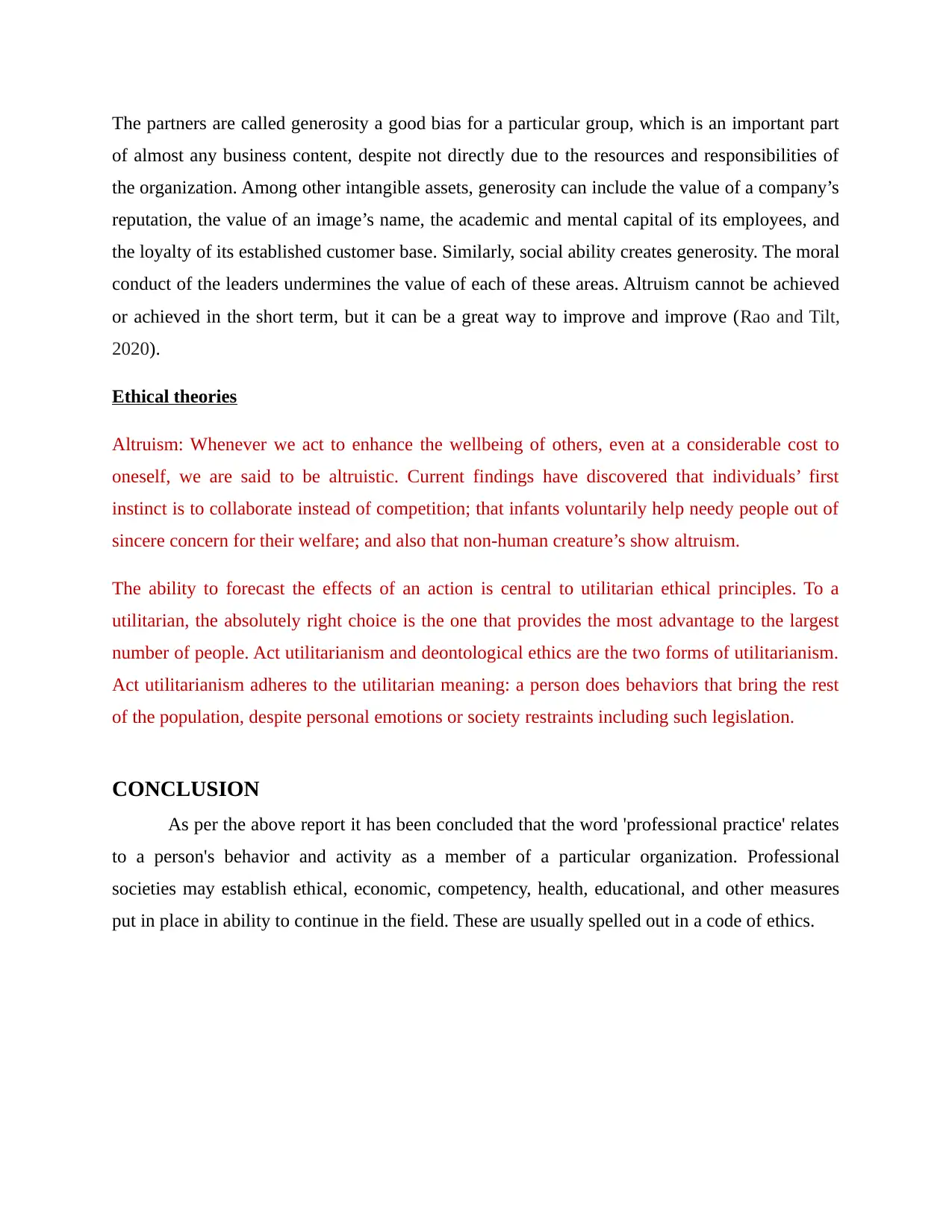
The partners are called generosity a good bias for a particular group, which is an important part
of almost any business content, despite not directly due to the resources and responsibilities of
the organization. Among other intangible assets, generosity can include the value of a company’s
reputation, the value of an image’s name, the academic and mental capital of its employees, and
the loyalty of its established customer base. Similarly, social ability creates generosity. The moral
conduct of the leaders undermines the value of each of these areas. Altruism cannot be achieved
or achieved in the short term, but it can be a great way to improve and improve (Rao and Tilt,
2020).
Ethical theories
Altruism: Whenever we act to enhance the wellbeing of others, even at a considerable cost to
oneself, we are said to be altruistic. Current findings have discovered that individuals’ first
instinct is to collaborate instead of competition; that infants voluntarily help needy people out of
sincere concern for their welfare; and also that non-human creature’s show altruism.
The ability to forecast the effects of an action is central to utilitarian ethical principles. To a
utilitarian, the absolutely right choice is the one that provides the most advantage to the largest
number of people. Act utilitarianism and deontological ethics are the two forms of utilitarianism.
Act utilitarianism adheres to the utilitarian meaning: a person does behaviors that bring the rest
of the population, despite personal emotions or society restraints including such legislation.
CONCLUSION
As per the above report it has been concluded that the word 'professional practice' relates
to a person's behavior and activity as a member of a particular organization. Professional
societies may establish ethical, economic, competency, health, educational, and other measures
put in place in ability to continue in the field. These are usually spelled out in a code of ethics.
of almost any business content, despite not directly due to the resources and responsibilities of
the organization. Among other intangible assets, generosity can include the value of a company’s
reputation, the value of an image’s name, the academic and mental capital of its employees, and
the loyalty of its established customer base. Similarly, social ability creates generosity. The moral
conduct of the leaders undermines the value of each of these areas. Altruism cannot be achieved
or achieved in the short term, but it can be a great way to improve and improve (Rao and Tilt,
2020).
Ethical theories
Altruism: Whenever we act to enhance the wellbeing of others, even at a considerable cost to
oneself, we are said to be altruistic. Current findings have discovered that individuals’ first
instinct is to collaborate instead of competition; that infants voluntarily help needy people out of
sincere concern for their welfare; and also that non-human creature’s show altruism.
The ability to forecast the effects of an action is central to utilitarian ethical principles. To a
utilitarian, the absolutely right choice is the one that provides the most advantage to the largest
number of people. Act utilitarianism and deontological ethics are the two forms of utilitarianism.
Act utilitarianism adheres to the utilitarian meaning: a person does behaviors that bring the rest
of the population, despite personal emotions or society restraints including such legislation.
CONCLUSION
As per the above report it has been concluded that the word 'professional practice' relates
to a person's behavior and activity as a member of a particular organization. Professional
societies may establish ethical, economic, competency, health, educational, and other measures
put in place in ability to continue in the field. These are usually spelled out in a code of ethics.
⊘ This is a preview!⊘
Do you want full access?
Subscribe today to unlock all pages.

Trusted by 1+ million students worldwide
1 out of 14
Related Documents
Your All-in-One AI-Powered Toolkit for Academic Success.
+13062052269
info@desklib.com
Available 24*7 on WhatsApp / Email
![[object Object]](/_next/static/media/star-bottom.7253800d.svg)
Unlock your academic potential
Copyright © 2020–2026 A2Z Services. All Rights Reserved. Developed and managed by ZUCOL.





